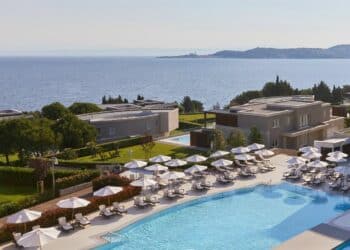Francios Kassab, COO, Millennium and Copthorne, Middle East and Africa tells Sophia Soltani why it is imperative for Millennium and Copthorne to reach its goal of having 100 hotels by 2020, and how the introduction of multilingual websites will boost the group’s revenue stream.
You spent nine years with IHG and left your role there as head of finance and business Support for the Middle East and Africa, how has this experience placed you in good stead for your role as COO with Millennium and Copthorne?
During my time as head of finance and business support for Middle East and Africa at IHG, I was responsible for a multi-billion-dollar turnover across a number of countries as well as supporting a pipeline of new openings. Working for a global hospitality group such as  IHG enabled me to develop a strong network and gain extensive commercial experience across the region. This experience has equipped me with the tools to implement, and oversee a solid development strategy for the group as it enters a new era of growth. I originally joined Millennium and Copthorne as chief financial officer and this background has also given me the necessary skills to oversee the financial operations of the group. In my role as COO, I look forward to leading the successful implementation of our corporate strategy and driving profitability across the group’s hotel operations across the Middle East and Africa.
IHG enabled me to develop a strong network and gain extensive commercial experience across the region. This experience has equipped me with the tools to implement, and oversee a solid development strategy for the group as it enters a new era of growth. I originally joined Millennium and Copthorne as chief financial officer and this background has also given me the necessary skills to oversee the financial operations of the group. In my role as COO, I look forward to leading the successful implementation of our corporate strategy and driving profitability across the group’s hotel operations across the Middle East and Africa.
What are your top priorities as COO for Millennium and Copthorne?
Millennium and Copthorne MEA is a dynamic and rapidly growing hotel operator with a bright and exciting future ahead. The group has recently undergone significant changes, as we prepare for extensive expansion across the region, including the appointment of a new and very talented executive team. I am confident that we are well placed to continue to increase our presence in the region and achieve our aim to have 100 hotels by 2020.
Our corporate strategy is clear and we aim to drive revenues through more profitable channels. As we know the distribution landscape for hotels has dramatically changed over recent years, particularly with the rise of digital and social media platforms and it is vital that we evaluate and understand the value of each channel.
Ware the key facets of your 2016-2017 business strategy?
Of course, we will continue to drive the highest returns for our owners and deliver exceptional experiences for our guests, ensuring we remain a key player in the hospitality industry.
We recently launched a new global, multi-lingual website which gives our customers an engaging and effortless booking experience. The new interactive platform transforms the online journey, empowering guests to book stays, upgrades, amenities and experiences as well as get destination tips and manage and spend their My Millennium loyalty programme earnings and status. A key part of this is our new custom-built CRM system that allows us greater customer engagement, which in turn allows targeted communications, tailored to each guest. This investment reflects our focus on building a closer relationship with our guests as well as targeting key source markets by offering Arabic, Russian, and most importantly Mandarin versions. We have been looking to capture business from new source markets such as China and are developing tailored seasonal campaigns and promotions as well as increase the number of multilingual employees to cater towards this.
We will be focused on optimizing revenues and profits from all revenue streams including rooms, F&B, spa and all other facilities. It is about finding the most profitable mix of business and implementing pricing strategies as well as encouraging loyal guests by understanding their individual requirements and preferences.
Expansion and development in Saudi Arabia will continue to be a strategic focus for us. We currently have over 10,000 keys in the pipeline and are set to open over 20 high profile properties over the next five years, making us the fastest growing hospitality companies in the region. We recently obtained our KSA license and will be opening a fully-fledged office in Jeddah.
What is the latest on Millennium and Copthorne’s regional footprint and pipeline in the Middle East and Africa?
We are excited to extend our footprint in the region with a strong pipeline of new openings in place. With over 40 hotels in development, totaling more than 20,000 rooms, we now have one of the Middle East’s biggest pipelines and are on track to meet our long-term goal to have 100 hotels by 2020.
We have moved forward with our expansion plans in Saudi Arabia with the opening of Millennium Hail in the north west of the Kingdom and are looking forward to launching our first property in the capital with Copthorne Riyadh.
Key openings scheduled over the next twelve months include the luxurious 677-room Bab Al Qasr as well as Grand Millennium Hotel Muscat, Biltmore Tbilisi, Kingsgate Al Safa, Kingsgate Al Henaway, Millennium Plaza Doha, Copthorne Falcon Hotel Muscat and Millennium Tabouk.
 With over 10,000 keys in the pipeline for Saudi Arabia, why is the region a prime target area for expansion and what future potential for growth is there here?
With over 10,000 keys in the pipeline for Saudi Arabia, why is the region a prime target area for expansion and what future potential for growth is there here?
The development strategy within Saudi Arabia not only supports the growth within the Kingdom but supports the brand recognition across the country.
Saudi Arabia has the largest economy in the region and its relative resilience to global economic downturns and wealth allows us to explore many hotel opportunities. The government has invested heavily into infrastructure, including air, road and rail transport, as well as commercial and real estate developments, resulting in a positive long-term outlook for the hospitality sector.
There is considerable demand for mid-market international branded hotels and we are looking to address this gap with our major expansion. The government is working on a long-term strategy focused on economic diversification and encouraging business travel meaning the opportunity to build affordable and budget accommodation is lucrative.
Why was the decision taken to expand into other provinces of Saudi and not just in the Holy Cities? What brands are you set to debut there?
We feel that there is major potential across the whole of the Kingdom and plan to open in secondary cities across the North, South and Western provinces. Currently, these cities lack presence from hotels with international hospitality standards and increased government expenditure combined with the implementation of the Extended Umrah Tourist Programme, which allows religious tourists to travel freely around the country, means there are plenty of opportunities.
Hail is witnessing major investment into infrastructure such as the redevelopment of the airport and the development of Hail Economic City and as the only five-star hotel in the city, it is set to make its mark on the current hospitality offering. We aim to increase brand recognition across the Kingdom as KSA acts as a feeder market for the Middle East.
What factors do you expect to drive demand, revenue and occupancies in the upcoming properties across the Middle East over the next 12 months?
In 2016 and beyond, Chinese outbound travel is expected to grow at an unprecedented pace, with the number of outbound Chinese travellers expected to double from 100 million to 200 million by 2020. This will have a natural ripple effect on arrivals to the GCC.
We also expect the number of Indian and South East Asian visitors to grow, with tourism boards such as Sharjah and Ras Al Khaimah driving promotional efforts in these regions. Saudi Arabia will remain one of the most important source markets for interregional travel in addition to the pilgrim markets in the Holy Cities of Makkah and Madinah.
Family travel is also expected to continue driving revenue. We see huge potential for growth within this segment, particularly in Dubai, with plans for family-friendly attractions and theme parks such as Legoland Dubai and Meraas’ Dubai Parks & Resorts taking shape.
In your opinion, what new key markets are up and coming?
Georgia is a key growth market that is attracting significant interest from many hotel operators due to recent investment into the tourism sector by the government. We will be launching our first property in Georgia this year with Biltmore Tbilisi, the first Biltmore hotel to open outside of the United States. We have also identified Turkey and Northern Africa as potential areas for development.
What is your long-term growth plan for Millennium and Copthorne in the region, and how do you plan on making this plan a success?
We are excited to extend our footprint with a strong pipeline of new openings in place, including several new brands that will reinforce our position as one of the fastest growing hotel companies in the GCC.
An important opening for us this year will be the 5-star 677-room Bab Al Qasr in Abu Dhabi. Located on the Corniche area, near to the Presidential Palace, it will be one of the largest hotels in the city, offering unparalleled levels of luxury and an outstanding guest experience. Other key openings for the remainder of the year include Grand Millennium Hotel Muscat, Biltmore Tbilisi, Millennium Plaza Doha and Copthorne Falcon Hotel Muscat.
There has been much buzz in the industry regarding Iran, how do you think the lifting of the sanctions will impact the hospitality industry there, and are there any plans to develop Millennium and Copthorne Hotels here?
We are always exploring new markets and believe there is high potential for hotel development and growth in Iran. The lifting of sanctions will attract both business travellers due to the restoration of access to the global financial markets and efforts to attract foreign investment and leisure tourists attracted by the country’s historic buildings, ancient sites and mountains. This may take some time but we believe once this transitional period is complete then there will be huge opportunities for hotel development.


































































